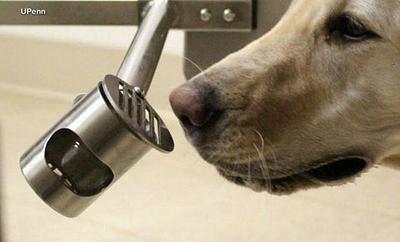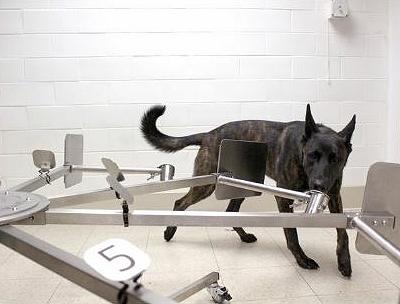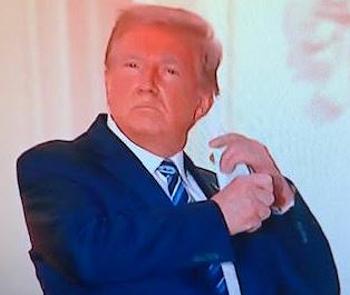
PHILADELPHIA, Pennsylvania, May 6, 2020 (ENS) – Scent detection dogs are being trained to discriminate between samples from COVID-19 positive and COVID-19 negative patients under a new research initiative at the University of Pennsylvania’s School of Veterinary Medicine, usually called Penn Vet.
Preliminary screening of live humans by trained dogs could begin as early as July. Even if the testing and training are successful, the dogs would not replace a regular COVID-19 test Penn Vet doctors say.

Dogs are uniquely positioned to aid in disease detection, because they have up to 300 million smell receptors, compared to six million in humans.
This pioneering study sets the stage for dogs to be a “force multiplier in the mission to detect COVID-19, particularly among asymptomatic patients, or hospital or business environments where testing is most challenging,” Penn Vet said in a statement.
The canine training is financially supported in part by the new Penn Vet COVID-19 Research Innovation Fund.
Provided with critical start-up funds through a gift from well-known dog lovers banker Vernon Hill and his wife, Shirley Hill, founder of the architectural and branding firm InterArch, the fund will bolster Penn Vet’s expanding research and response program to fight the novel coronavirus.
“Dogs and humans, perfect together as man’s best friend, through Penn Vet in partnership with the Perelman School of Medicine and the Children’s Hospital of Philadelphia, provide a new solution to COVID-19,” said Vernon Hill. “Shirley and I, and Sir Duffield, our beloved Yorkshire Terrier, are again proud to support Penn Vet.”
Penn Vet is starting the study with eight dogs to perform this precise detection work. For three weeks, through a process called odor imprinting, the dogs will be exposed to COVID-19 positive saliva and urine samples in a laboratory setting.
Once the dogs learn the odor, the investigators will document that the dogs can discriminate between COVID-19 positive and COVID-19 negative samples in a laboratory setting, establishing the platform for testing to determine if the dogs can identify COVID-19 infected people.
“Scent detection dogs can accurately detect low concentrations of volatile organic compounds, otherwise known as VOCs, associated with various diseases such as ovarian cancer, bacterial infections, and nasal tumors. These VOCs are present in human blood, saliva, urine or breath,” said Cynthia Otto, DVM, PhD, professor of Working Dog Sciences and Sports Medicine and director of Penn Vet’s Working Dog Center.
“The potential impact of these dogs and their capacity to detect COVID-19 could be substantial. This study will harness the dog’s extraordinary ability to support the nation’s COVID-19 surveillance systems, with the goal of reducing community spread,” Dr. Otto said.

Otto will lead a group of multi-disciplinary researchers from across the University of Pennsylvania. The U.S. Army Combat Capabilities Development Command Chemical Biological Center will lend their expertise during the study as well.
“This pilot study could not be more emblematic of Penn Vet’s unparalleled contributions to public health,” said Andrew Hoffman, DVM, DVSc, the school’s dean of veterinary medicine. “What we do, and how we do it is relevant now more than ever before.”
“The collaboration between Penn Vet, the School of Medicine, the School of Arts and Sciences, and the Children’s Hospital of Philadelphia, are critical to success. I’m grateful for Vernon and Shirley Hill’s longstanding generosity that will allow us to swiftly accelerate our diagnostic, detection, and surveillance capabilities to fight COVID-19.”
Penn Vet’s COVID-19 Research Innovation Fund is raising funds to support Penn Vet’s research laboratories that are already tackling problems associated with COVID. Ronald Harty, PhD, professor of Pathobiology and Microbiology, is using his lifetime expertise investigating Ebola, Marsburg, and Lassa Fever, to understand how the SARS-CoV-2 virus leaves cells and spreads to other cells.
Andrew Vaughan, PhD, assistant professor of Biomedical Sciences, is leveraging his work examining virally-induced lung injury to understand how the SARS-CoV-2 promotes disease, and in collaboration with Montserrat Anguera, PhD, associate professor of Biomedical Sciences, is investigating the factors that contribute to sex bias in the development of more severe COVID disease.
Importantly, Penn Vet’s COVID-19 Research Innovation Fund will not only help these projects but will also promote an expansion of the number of Penn Vet scientists focusing on new ways to conquer SARS-CoV2.
“Penn Vet is a key part of the biomedical community here at the University of Pennsylvania. We are leveraging our unique and collective expertise in pathogen-related research, infectious disease, and translational medicine to fight this pandemic, said Phillip Scott, PhD, vice dean for research and academic resources. “Penn Vet’s COVID-19 Research Innovation Fund is affording us the agility to make immediate and significant strides toward solving this public health emergency.”
Founded in 1884, Penn Vet is the first veterinary school developed in association with a medical school. The school is a proud member of the One Health initiative, linking human, animal, and environmental health.
Now ranked among the top 10 veterinary schools worldwide, the University of Pennsylvania School of Veterinary Medicine is a global leader in veterinary education, research, and clinical care.
Copyright Environment News Service (ENS) 2020. All rights reserved.



